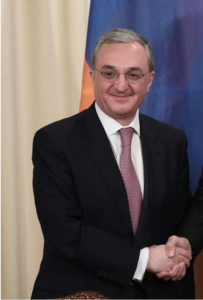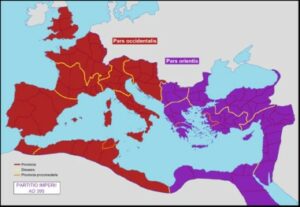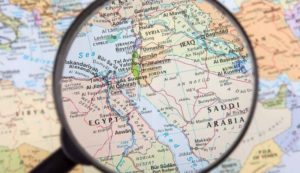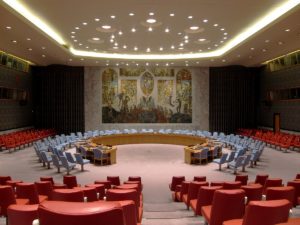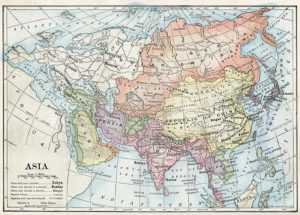Intervention de Caroline Galactéros le 22 octobre 2019 au MGIMO, – RAMI 12 th Convention – , dans le cadre du Dialogue de Trianon.
Dr. Caroline Galactéros
October 22nd 2019
MGIMO
RAMI 12th Convention
CONFERENCE
“THE SECOND TRACK DIPLOMACY: NECESSARY OR COUNTERPRODUCTIVE TOOL TOWARDS STRATEGIC DECONFLICTION?”
Dobridien Dami e Gospoda,
Good morning, Ladies and Gentlemen,
I am Caroline Galactéros, Founder and President of the French geopolitical Think and Action Tank GEOPRAGMA. A platform that is apolitical and seeks to analyze the key geopolitical evolutions of our times in a dispassionate and objective manner. At times to proclaim loudly what some people think to themselves.
I take this opportunity to warmly thank Anatoly Vassilievitch Torkunov, the Rector of MGIMO, for having invited me to this very interesting conference, and for having asked me to address you on the topic of a “Second Track Diplomacy”. A vast subject but very much topical thesedays. Actually, I will try to act as a “second-track” diplomat of this approach with you today.
A nation’s foreign policy is naturally at the heart of its sovereignty. It is as well a reflection of its domestic policy. Built in some cases over hundreds of years, it poses the principles of a nation’s primary national interests, be they in the political, economic, military, or digital spheres.
Napoleon initiated if for France. In turn, Tsar Peter the Great laid the ground of Russia’s modern foreign policy. In these two empires’ and countries’ histories, even through regime changes, there has been a continuity in the definition of national interests, doctrines of foreign policy, and relations with other nations.
More recently, President Putin has resurrected a strong Russia that projects itself globally again with some notable successes, in Syria and the whole middle east for example.
My President, Emmanuel Macron, has also dedicated his efforts to reset relations with Russia and the European Union with some successes, and France continues its commitment in fighting Islamic jihadist terrorists in Sub-Saharan and Western Africa, and in the Middle East. A goal which asks for consistent and non-dogmatic approach of the reality. OK…Nobody’s perfect, but we are on the right track.
The term of a “second track” diplomacy applies itself to a variety of organizations: Universities, Non-Governmental Organizations, Think Tanks, medias and so forth.
And this was precisely my Vision in launching Geopragma two years ago: to defend a certain idea and grandeur of France, to help reinforce the key dimensions of its sovereignty, to gather all pragmatic analysts, experts and decision makers on international matters, to progressively settle a new way of addressing and managing crisis and conflicts in the French strategic landscape.
To do so, we need to recover our strategic DNA: independence of thinking and of acting which is at the very essence of our nation.
How? in promoting open dialogue among all of these actors, in respect for their national interests and values to defreeze, depressurize the bellicose atmosphere amongst all nations and to try to be innovative, for a change.
So, we are all actors in this Second Track Diplomacy which , in a way, is to international relations what civil society is to politics. We are a new weight in the balance of influences and perceptions, able to have an impact on the evolving global and regional balance of power and alliances.
As a new second track diplomacy channel, we do not attempt to re- create a nation’s foreign policy nor are we actors in the exercise of its formal and official diplomacy. That is the privileged domain of a given nation.
Rather, we can analyze, question and in the vast majority of cases, enrich the nations’ positions through ideas, debates and visions, in a multi-lateral fashion. And this progressively changes the strategic ecosystem.
And in a world that today looks very unilateral, in some ways harking back to the 1930’s, we can have an fruitful input on the outcome of crises or conflicts by promoting and enlivening old virtues which are at stake or despised by the temptation of some to overcome the necessity and rules of dialogue to impose their will.
We need to respect basic rules of state sovereignty and security concerns, to speak especially with those you don’t share the views is urgent, crucial. Actually, it is mandatory to find a path to appeasement. I don’t believe that pure peace on earth is achievable, but I believe in multi-lateralism and in strong bilateral relationships which are not contradictory in themselves.
I believe in Relationships based on reliability and respect. In the world affairs, the human dimension and the ability to feel and express empathy has never been more important than today, were some to believe that algorithms can lead our minds, hearts and lives and that one day, they could even resolve disputes… So stupid, so risky.
Multi-lateralism is a swear word to some, but I think we will agree that it is vital to the prosperity of today’s international relations and that of our world’s future, tomorrow.
We thought that Man had become wiser since all the human disasters and wars we all waged for various reasons… but the jungle is still here, even wilder than before, with the utopia of technological dominance and IA potentialities. Man believes more than ever in its invincibility ; a childish but invasive dream…
Unfortunately, In Europe, frightened even by the idea of war, our diplomats and their leaders are most of the times frozen in mental and dogmatic visions of the world, of the enemy, of the good and the bad guy. They don’t observe or think by themselves, they follow, they prefer to obey, praying for a miracle to come, and for America to stay as an everlasting protector. But do we really need this kind of protection? Where are the threats? Russia, China, America, migrants, communitarianism , migrations, Islamism…?
Like in a Disney film, they want to keep their illusions and kiss the prince. But by doing so, they’re losing precious opportunities and they deny the reality which remains, the bottom of any efficient action.
In France the Second track diplomacy (STD) is of bad reputation, often called “diplomatie parallèle” to evoke its dark or gloomy aspects, badly interfering with the official ways, linked with deep state .
Actually, you can imagine tow paths for STD:
First one : you have the official line challenged and criticized trough other channels, put under intellectual pressure to evolve, innovate. The problem is that it long and hard to make the politicians sea reality and becoming consistent….
Second path : you have the official line backed by the second track channels and networks to amplify its efficiency and maximize the legitimacy of a given political decision.
Of course, in an ideal world of diplomatic and strategic efficiency, these two paths should of course merge to form a new level of political consciousness enabling us to do what we should to innovate and succeed…
But there is also a problem in the second case: You’re dependent; financially, institutionally, politically.
You cannot really criticize or challenge the hand that feeds you…
If you dare to, you can be suddenly marginalized, deprived of access to mainstream media, or even demonized by your intellectual enemies as “anti-French” or “pro-Russian for example”! Generally, it’s done by those who actually are under real intellectual dependence. Still, for me, it is possible and absolutely essential to think as a free and innovative spirit which I ‘m proud of being, for the sake of my country and despite any kind of pressure. This is the challenge of Geopragma.
Perhaps, the French national interest is now to disobey and to reconquer our strategic independence, revisiting current military alliances and taking the lead of a new vision of Europe and of course of Russia for Europe, seeking our interest in economic and political cooperation in Eurasia.
Allow me to illustrate this point with 3 examples.
First, in re-building France’s position and influence in the European Union and the Union itself, it goes without saying that a necessary ingredient is a stable and strong Franco-German axis. That is repeated constantly by the “establishment” and most analysts. Where I differ, is that above and beyond this axis, France must also develop close relations with what are pejoratively called “smaller countries”. It is in our national interest to structure a framework that includes Northern and Eastern and southern European countries. Not only to project France’s influence but to also build solutions to a host of issues such as migrations and security. Why not? And this is not to mention environmental issues for with STD is more urgent than ever to reach a collective consciousness and definition of the public goods for humanity.
Secondly, France can take a leading role in establishing a European Defense policy. A much talked-about topic since the Balkan Wars of the 1990s but followed by zero action since. As you know France is a nuclear nation, a permanent member of the United Nations’ Security Council, and in these times of an isolationist US foreign policy, it is conceivable that France leave an biased and outdated NATO organization with a sufficient number of European Union members to create the “European Defense Organization” or EDO. With the protection of its nuclear umbrella. The advantages are two-fold: to reassert fully its sovereignty and reducing considerably tensions with Russia. Why not?
Third, France can play a key role in finding a peaceful outcome to the crisis between Ukraine and Russia. Beyond the Normandy framework. To promote both of these nations’ interests by leading an effort to convince Ukraine’s leadership that their future does not lie within the European Union and NATO, even if it is enshrined in its constitution. Constitutions after all can always be amended. Rather, to be a neutral state as Finland was during the Cold War, reassuring Russia relative to its Near Abroad, eliminating the sanctions against Russia, and by building a coalition of states, including Russia, to strongly develop Ukraine’s economy and exchanges with its neighbors, other European and North American countries, and China. Why not?
These three examples represent a complete change in paradigm. Mentally and concretely :
It is not easy to achieve but it must be attempted and in my opinion, this is the “right” way. To think differently, “out of the box”, by analyzing the existing dynamics of today’s geopolitical situations in order to nudge nations toward this change.
And in the case of France, for it to reassert the unique position and influence it had under President de Gaulle. So even if these examples are a departure from a certain consensus and existing foreign policies, it is a possible and credible logical evolution. And in doing so, we can all play this role as a necessary tool towards a strategic deconfliction.
We are today at an unprecedented level of international relations reconfiguration 30 years after the fall of the Berlin Wall.
Lot of threats, dangers common stakes but also lot of opportunities for the French Russian relationship in Europe as well as for this relation towards China, Turkey, and the whole Middle East.
All that reinforces the potential value of a smart, both pragmatic, respectful and human led Second track diplomacy.
Geopragma has this very ambition to disrupt classical and outdated ways of perceiving the rest of the world and it is dedicated to this innovative approach by first changing the French strategic eco system.
We are young, poor, but we have ideas, projects and we are open to initiate fruitful and concrete initiatives, inclusive of platforms of dialogue, , small-committee exchanges, permanent task forces or workshops, mixing political and economic issues. To become a precious tool towards strategic deconfliction.
If you have ideas, just feel free to approach me. I don’t bite!
Thank you for your attention
Spasibo bolchoî

